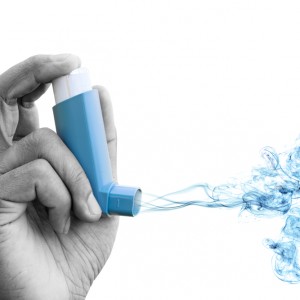 A new study titled, “Prevalence and characteristics of asthma in the aquatic disciplines” indicates that about 25% of competitive swimmers have asthma, and that this problem occurs more frequently in some parts of the world compared to others, or based on the kind of swimming involved. The problem may lie in the extensive exposure to chlorine that swimmers experience. Divers, for example, who do not spend much time in the water, did not appear to have a higher incidence of asthma. The study is available in The Journal of Allergy and Clinical Immunology.
A new study titled, “Prevalence and characteristics of asthma in the aquatic disciplines” indicates that about 25% of competitive swimmers have asthma, and that this problem occurs more frequently in some parts of the world compared to others, or based on the kind of swimming involved. The problem may lie in the extensive exposure to chlorine that swimmers experience. Divers, for example, who do not spend much time in the water, did not appear to have a higher incidence of asthma. The study is available in The Journal of Allergy and Clinical Immunology.
Dr. Margo Mountjoy of McMaster University Waterloo campus in Ontario, Canada and collaborators conducted the recent study. Mountjoy is a practicing sports physician in aquatics, and a member of the Therapeutic Use Exemption Committee for the International Olympic Committee and the World Anti-Doping Association.
The researchers studied asthma in all water athletes participating at the 2005, 2007 and 2009 FINA World Championships and the 2004 and 2008 Olympic Games. The events that the investigators studied included swimming, synchronized swimming, diving, water polo and open water swimming events.
Inhaled medications are usually prohibited, so athletes with asthma had to present clinical evidence that they had problems with breathing.
Overall, the study showed that people who were competitive swimmers had higher incidences of asthma than other aquatic events, for a total of 12 and 25 percent of swimmers with asthma. There was one exception however, since at the 2008 Olympic Games synchronized open water swimmers also had high asthma rates. In 2008, 25 percent of swimmers, 26 percent of open water swimmers and 22 percent of synchronized swimmers had asthma.
[adrotate group=”11″]
Mountjoy noted, “I was not surprised to find that swimmers had a high prevalence of asthma. What was surprising for me to find was that there were significant differences between the endurance and non-endurance sports, as well as the distinct geographical distributions.”
A higher number of the athletes from Oceania, Europe and North America had asthma compared to Asia, Africa and South America. There is usually a gender difference in asthma, however, this difference was not observed in the study.
Mountjoy remarked, “It was also interesting to find that although asthma is more prevalent in women than in men in the general population, this gender difference was not evident in the elite aquatic population.”
Lead author Mountjoy feels that a long-term study is needed, and that it would be helpful to tell the difference “between athletes with asthma who self-select to swimming and those who have asthma as a result of exposure to endurance training practices.”
Because people who swim in ocean events do not have elevated asthma rates, it is most likely that the chlorine exposure accounts for the higher rate of the condition in the competitive swimmers examined in this study.


So I’m on a swim team and I have a problem with my breathing and I have been disqualified because I stopped or messed up due to breathing. The only bad part is that I’m 11 years old. What should I do?
Hi Jenna
Ask to see your family doctor, describe your symptoms to them.
If they feel you may have exercise induced asthma they may prescribe you an inhaler.
Alternatively pick one of the sports in the study with a lower rate of asthma
https://marlin-prod.literatumonline.com/cms/attachment/2035625554/2051225056/gr3_lrg.jpg